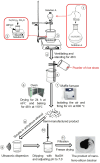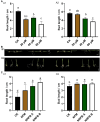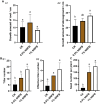New nano-ferro-silicon biochar promotes plant growth and grain yield under arsenic stress in rice
- PMID: 40385235
- PMCID: PMC12081388
- DOI: 10.3389/fpls.2025.1556696
New nano-ferro-silicon biochar promotes plant growth and grain yield under arsenic stress in rice
Abstract
Arsenic (As) is a ubiquitous and toxic metalloid in nature, posing significant risks to living organisms. Developing sustainable strategies to mitigate As stress and reduce As accumulation in rice is critical for ensuring food safety in contaminated regions. Herein, we synthesized a new nano-ferro-silicon biochar (NNFB) composed of biochar, γ-Fe2O3, and SiO2, which effectively adsorbed As from aqueous solutions and soil. NNFB alleviated As toxicity by promoting rice seeding and root growth at the seed germination and seeding stages. Under 40 μM As(III) treatment, application of 0.25% and 0.5% NNFB regulated the reactive oxygen species (ROS) balance by reducing H2O2 accumulation and enhancing peroxidase (POD) activity in leaves. Additionally, NNFB reduced As uptake by regulating the expression of As transport genes OsABCC1, OsLsi1, and OsLsi2 at the seeding stage. In pot experiments with 40 mg/kg As(III)-contaminated soil, NNFB application significantly improved aboveground biomass, tiller number, and effective tiller count. Notably, seed number per plant increased by 6.93- and 7.93-fold in 0.5% and 1% NNFB treatments compared to the control. These findings demonstrate that NNFB efficiently adsorbs As, mitigates As stress at multiple growth stages, and enhances rice productivity, offering a promising solution for As-contaminated agricultural systems.
Keywords: arsenic stress alleviation; grain yield; new nano-ferro-silicon biochar; plant growth promotion; rice.
Copyright © 2025 Fang, Dong, Ye, Zhang and Liu.
Conflict of interest statement
The authors declare that the research was conducted in the absence of any commercial or financial relationships that could be construed as a potential conflict of interest.
Figures







References
-
- Chandrakar V., Naithani S. C., Keshavkant S. (2016). Arsenic-induced metabolic disturbances and their mitigation mechanisms in crop plants. Biol. 71, 367–377. doi: 10.1515/biolog-2016-0052 - DOI
-
- Chatterjee A., Mridha D., Banerjee J., Chanda S., Ray K., Acharya K., et al. . (2021). Green synthesis of iron oxide nanoparticles and their ameliorative effect on arsenic stress relief in Oryza sativa seedlings. Biocatal. Agric. Biotechnol. 38, 102207. doi: 10.1016/j.bcab.2021.102207 - DOI
LinkOut - more resources
Full Text Sources
Research Materials

